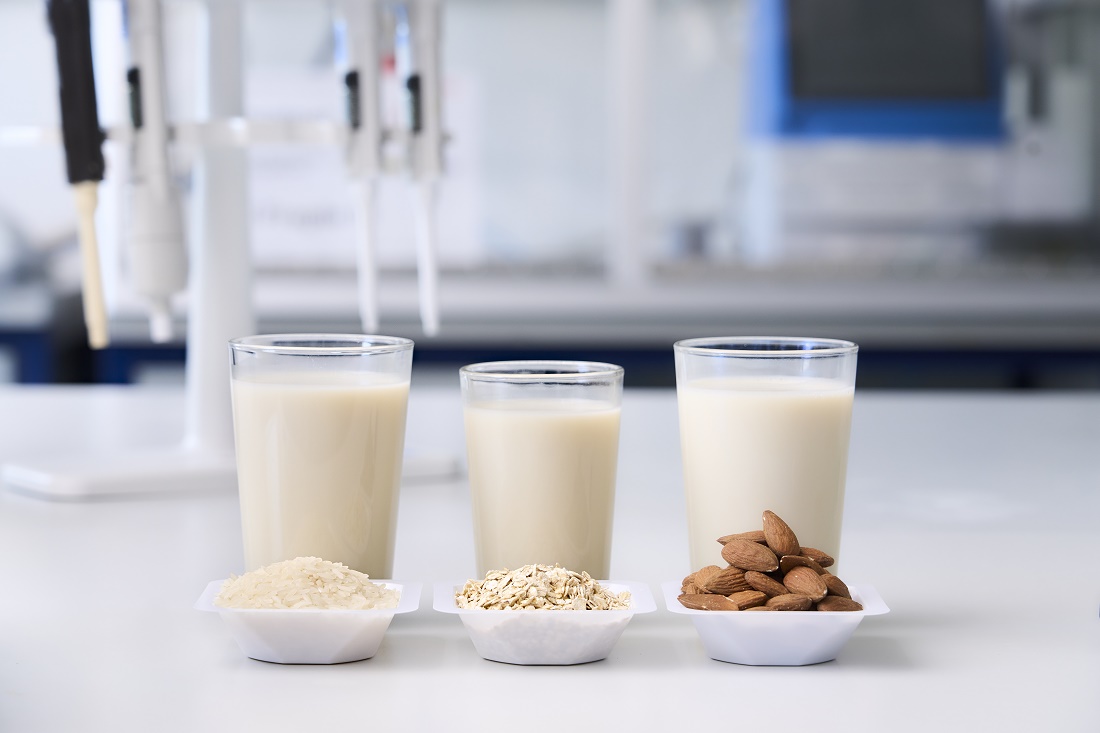A University of Copenhagen study of plant-based drinks reveals a common issue: they are lacking in proteins and essential amino acids compared to cow's milk. The explanation lies in their extensive processing, causing chemical reactions that degrade protein quality in the product and, in some cases, produce new substances of concern.
Over the last decade, the global market for plant-based beverages has seen remarkable growth, with oat, almond, soy and rice drinks emerging as popular alternatives to cow's milk in coffee and oatmeal during this time.
One of the likely reasons for millions of liters of plant-based drinks ending up in the shopping baskets of consumers is that their climate footprint is often lower than that of cow's milk. But consumers would be mistaken if they considered plant-based beverages healthier than cow's milk. This is highlighted in a new study conducted by the University of Copenhagen in collaboration with the University of Brescia, Italy.
In the study, researchers examined how chemical reactions during processing affect the nutritional quality of ten different plant-based drinks, comparing them with cow's milk. The overall picture is clear:
"We definitely need to consume more plant-based foods. But if you're looking for proper nutrition and believe that plant-based drinks can replace cow's milk, you'd be mistaken," says Department of Food Science professor Marianne Nissen Lund, the study's lead author.
Long shelf life at the expense of nutrition
While milk is essentially a finished product when it comes out of a cow, oats, rice, and almonds require extensive processing during their conversion to a drinkable beverage. Moreover, each of the plant-based drinks tested underwent Ultra High Temperature (UHT) treatment, a process that is widely used for long-life milks around the world. In Denmark, milk is typically found only in the refrigerated sections of supermarkets and is low-pasteurized, meaning that it receives a much gentler heat treatment.
- The study examined two types of UHT-treated cow's milk and 10 types of UHT-treated plant-based drinks sold in Scandinavia from three different producers. These included six oat drinks, one soy drink, one rice drink, one almond drink, and a drink based on a blend of soy, rice, almond and oat.
- The scientific article detailing the study has been published in Food Research International.
- The researchers behind the study are Halise Gül Akıllıoğlu, Marta Bevilacqua and Marianne Nissen Lund from the Department of Food Science at the University of Copenhagen, as well as Mariachiara Pucci and Giulia Abate from the University of Brescia, Italy.
"Despite increased plant-based drink sales, cow milk sales remain higher. Consequently, plant-based drinks undergo more intense heat treatments than the milk typically sold in Denmark, in order to extend their shelf life. But such treatment comes at a cost," says Marianne Nissen Lund.
UHT treatment triggers a so-called "Maillard reaction", a chemical reaction between protein and sugar that occurs when food is fried or roasted at high temperatures. Among other things, this reaction impacts the nutritional quality of the proteins in a given product.
"Most plant-based drinks already have significantly less protein than cow's milk. And the protein, which is present in low content, is then additionally modified when heat treated. This leads to the loss of some essential amino acids, which are incredibly important for us. While the nutritional contents of plant-based drinks vary greatly, most of them have relatively low nutritional quality," explains the professor.
For comparison, the UHT-treated cow's milk used in the study contains 3.4 grams of protein per liter, whereas 8 of the 10 plant-based drinks analyzed contained between 0.4 and 1.1 grams of protein. The levels of essential amino acids were lower in all plant-based drinks. Furthermore, 7 out of 10 plant-based drinks contained more sugar than cow's milk.

Heat treatment may produce carcinogens
Besides reducing nutritional value, heat treatment also generates new compounds in plant-based drinks. One such compound measured by the researchers in four of the plant-based drinks made from almonds and oats is acrylamide, a carcinogen that is also found in bread, cookies, coffee beans and fried potatoes, including French fries.






